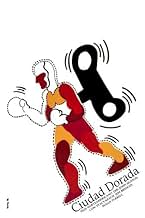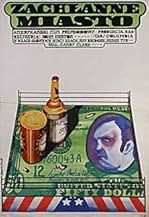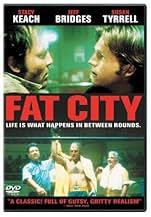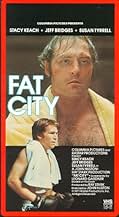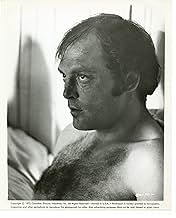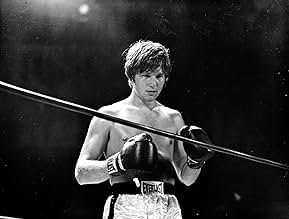AVALIAÇÃO DA IMDb
7,2/10
11 mil
SUA AVALIAÇÃO
Dois homens, que trabalham como boxeadores profissionais, são afetados quando suas carreiras começam a tomar um impulso oposto.Dois homens, que trabalham como boxeadores profissionais, são afetados quando suas carreiras começam a tomar um impulso oposto.Dois homens, que trabalham como boxeadores profissionais, são afetados quando suas carreiras começam a tomar um impulso oposto.
- Indicado a 1 Oscar
- 4 vitórias e 4 indicações no total
Álvaro López
- Rosales
- (não creditado)
Carl D. Parker
- Paymaster
- (não creditado)
Bill Riddle
- Boxer
- (não creditado)
Al Silvani
- Referee at Tully-Lucero Fight
- (não creditado)
Avaliações em destaque
Jeff Bridges is young and charming in this movie about an upcoming boxer who meets another boxer (Stacey Keach) who is going down the drain. First I expected it to be a standard boxer movie portraying a young man who was going to make it big. But soon I discovered this movie was about losing. About drunks and has beens. Depressing. But not so depressing that it isnt great to watch Stacey Keach perform a drunk so well. Another actress got nominated for an oscar, but it should have been Stacey Keach who really deserved an oscar. Never seen an actor perform a drunk so well. Almost couldnt believe that Keach was actually acting sometimes, because he looks so wasted and completely lost.
John Huston directed Fat City in a documentary kind of style. The photography resembles a real life look in the run down bars and boxing halls. Real life bums and poor people are being used as extras. This movie is depressing, even boring sometimes, but nevertheless still fascinating to watch, because of its true to life portrayal of everyday people.
My only criticism is that there is a romantic subplot with a woman that kinda slows down the movie in the middle. There is definitely a lack of dynamic in the middle. But hey, that is the life this drunk is leading. Nothing much happens except for another night with booze. And another... And if you can stumach a movie about losers who are going nowhere than you will appreciate this movie as much as I did.
However depressing the story might be at times, the photography and the acting are way up there, truly excellent!!! And because of these marvellous acting performances the depressing lowlife characters that are being portrayed in Fat City are still very endearing and fascinating to watch.
John Huston directed Fat City in a documentary kind of style. The photography resembles a real life look in the run down bars and boxing halls. Real life bums and poor people are being used as extras. This movie is depressing, even boring sometimes, but nevertheless still fascinating to watch, because of its true to life portrayal of everyday people.
My only criticism is that there is a romantic subplot with a woman that kinda slows down the movie in the middle. There is definitely a lack of dynamic in the middle. But hey, that is the life this drunk is leading. Nothing much happens except for another night with booze. And another... And if you can stumach a movie about losers who are going nowhere than you will appreciate this movie as much as I did.
However depressing the story might be at times, the photography and the acting are way up there, truly excellent!!! And because of these marvellous acting performances the depressing lowlife characters that are being portrayed in Fat City are still very endearing and fascinating to watch.
Fat City is a small film directed on location in Stockton, California by legendary director John Huston.
It is about small time boxers and small time losers. Stacy Keach is a washed up boxer, a drunk, making a comeback but really not up to it. He is in a tempestuous relationship with Susan Tyrell who is magnificent as his drunk girlfriend. The booze oozes out of her pores and she really cracks that paralytic look in her face.
Jeff Bridges is the up and coming boxer but he immediately loses his early fights, he gets his pretty girlfriend, Candy Clark pregnant and gets some irregular work as a labourer sometimes working with Keach in the fields.
There is nothing grandiose or bombastic about Fat City. It really is introverted dealing with the underclass in the early 1970s. The location filming adds a lot of authenticity and rawness.
Keach who was a noted Shakespearean actor of the American stage is very believable. He plays not a has been but a never was, who wants to have that one final crack of something big but he will get nowhere it as he always gets sidetracked, usually by booze.
Bridges at the time was the young up and comer with a mixture of enthusiasm and wide eyed innocence. He was 23 years old when he made this film and was already a veteran with an Oscar nomination to his name as he was a child actor working in his father's show.
A critic pointed out something novel about this boxing film. These almost desperate people we meet go out of their way to be kind to each other no matter how hopeless their situation.
When Keach argues with Tyrell you expect that he will hit her. When her ex-boyfriend turns up, you again expect that he will get in a fight with Keach. However you find people struggling to be nice and civil to each other.
Boxing actually plays a small part in the film. Fat City is a forgotten gem of 1970s cinema.
It is about small time boxers and small time losers. Stacy Keach is a washed up boxer, a drunk, making a comeback but really not up to it. He is in a tempestuous relationship with Susan Tyrell who is magnificent as his drunk girlfriend. The booze oozes out of her pores and she really cracks that paralytic look in her face.
Jeff Bridges is the up and coming boxer but he immediately loses his early fights, he gets his pretty girlfriend, Candy Clark pregnant and gets some irregular work as a labourer sometimes working with Keach in the fields.
There is nothing grandiose or bombastic about Fat City. It really is introverted dealing with the underclass in the early 1970s. The location filming adds a lot of authenticity and rawness.
Keach who was a noted Shakespearean actor of the American stage is very believable. He plays not a has been but a never was, who wants to have that one final crack of something big but he will get nowhere it as he always gets sidetracked, usually by booze.
Bridges at the time was the young up and comer with a mixture of enthusiasm and wide eyed innocence. He was 23 years old when he made this film and was already a veteran with an Oscar nomination to his name as he was a child actor working in his father's show.
A critic pointed out something novel about this boxing film. These almost desperate people we meet go out of their way to be kind to each other no matter how hopeless their situation.
When Keach argues with Tyrell you expect that he will hit her. When her ex-boyfriend turns up, you again expect that he will get in a fight with Keach. However you find people struggling to be nice and civil to each other.
Boxing actually plays a small part in the film. Fat City is a forgotten gem of 1970s cinema.
Huston always had an eye for characters. His movies almost all dealt with the concerns of lower middle class working joes, the "regular fellows" with whom Huston somehow identified in the romantic Hemingwayesque lantern jawed "a man's gotta do what a man's gotta do" tradition. But his characters were more than mere macho he-men. They displayed genuine and uncommonly powerful vulnerabilities, hopes and dreams, flaws and finally cynicism. After an incredible first 20-plus creative years, Huston floundered for almost a decade with commercial and artistic disappointments (FREUD, THE BIBLE, THE KREMLIN LETTER, SINFUL DAVEY among them) before coming back to his wheelhouse with the carefully subdued yet deeply affecting character study FAT CITY.
FAT CITY is a grand return to form for Huston precisely because it is so indelibly imbued with real life in the form of its unforgettably true characters. None of these people are particularly remarkable individuals (frankly they are mostly below average in self-awareness, skills and intelligence), yet because Huston is so skillful at revealing character through the carefully structured unfolding (and gradual unhinging) of Keach's character, we are given insights which Keach (and Bridges and Candy Clark and the wonderful Nicholas Colasanto) can't make for themselves because they are too close to their own situations. Bridges has a nice interlude and Colasanto is so good in his limited Burgess Meredith Mickeyesque role, but the heart of this movie is Stacy Keach, who rises to the occasion with uncommon subtlety and power. It is a rare movie that can document losers in their daily lives without editorializing or sermonizing. FAT CITY takes an unflinching glance at these people and shows us things which seem prosaic on the surface but which upon examination hide deeper meaning (and heartbreak).
There are no pyrotechnics, no real twists, no witty or stand out dialogue exchanges, not much going on with the camera (though Hall's coloring is as always very well chosen), and very little budget on display in FAT CITY. It appears Huston shot pretty much everything on location in the flophouses around Stockton, CA. Yet the performances are uniformly outstanding and we come to care about these losers as they fumpher through life kidding themselves about where they've been, where they are and where they are going. I can't think of a movie where less actually happens to the characters (maybe BARFLY) but where I still find myself so deeply involved. Whenever I see it playing on the tube I generally stay with it all the way. There are very few movies in that league for me.
Warning: do NOT go in expecting crowd-pleasing Rocky-esque boxing sequences. This is less the story of a Rocky and more the story of a Spider Rico (the "ham n' egger" Rocky beats up in his first fight and from whom we never hear again.) The movie disguises itself as a Horato Alger-like comeback or underdog story initially, but it is ultimately one of the bleakest, realest character studies you're ever likely to see. One of the best Huston movies to come after the 1960s and a downbeat classic. 9/10.
FAT CITY is a grand return to form for Huston precisely because it is so indelibly imbued with real life in the form of its unforgettably true characters. None of these people are particularly remarkable individuals (frankly they are mostly below average in self-awareness, skills and intelligence), yet because Huston is so skillful at revealing character through the carefully structured unfolding (and gradual unhinging) of Keach's character, we are given insights which Keach (and Bridges and Candy Clark and the wonderful Nicholas Colasanto) can't make for themselves because they are too close to their own situations. Bridges has a nice interlude and Colasanto is so good in his limited Burgess Meredith Mickeyesque role, but the heart of this movie is Stacy Keach, who rises to the occasion with uncommon subtlety and power. It is a rare movie that can document losers in their daily lives without editorializing or sermonizing. FAT CITY takes an unflinching glance at these people and shows us things which seem prosaic on the surface but which upon examination hide deeper meaning (and heartbreak).
There are no pyrotechnics, no real twists, no witty or stand out dialogue exchanges, not much going on with the camera (though Hall's coloring is as always very well chosen), and very little budget on display in FAT CITY. It appears Huston shot pretty much everything on location in the flophouses around Stockton, CA. Yet the performances are uniformly outstanding and we come to care about these losers as they fumpher through life kidding themselves about where they've been, where they are and where they are going. I can't think of a movie where less actually happens to the characters (maybe BARFLY) but where I still find myself so deeply involved. Whenever I see it playing on the tube I generally stay with it all the way. There are very few movies in that league for me.
Warning: do NOT go in expecting crowd-pleasing Rocky-esque boxing sequences. This is less the story of a Rocky and more the story of a Spider Rico (the "ham n' egger" Rocky beats up in his first fight and from whom we never hear again.) The movie disguises itself as a Horato Alger-like comeback or underdog story initially, but it is ultimately one of the bleakest, realest character studies you're ever likely to see. One of the best Huston movies to come after the 1960s and a downbeat classic. 9/10.
John Huston is amazing to me. He defined an entire genre with his foot barely in the Hollywood door, then he kicked the door down and walked in to clear well deserved Oscars as both writer and director, he took his Oscars with him to Africa to get hammered with Erol Flynn and go out on safaris leaving behind him a big production to go to hell, then came back to find they had nailed a new door in place of the one he had torn down so he didn't bother to knock at all this time, he packed his things and went to a small dingy bar where Mexicans and barflies go to kill their time to make movies about killing time, movies about misfits and people who are dead inside, movies like Fat City and Under the Volcano, to adapt Flannery O'Connor and James Joyce, to soar above and beyond what anyone might have expected from any director of his generation. It's 1972 and John Huston is still relevant as ever. How many directors can you name who turned out some of their best material in their fifth decade directing movies? Venerable relics like Clint Eastwood move over, American cinema (not simply Hollywood) already had a patriarch in place long before any of you looked through a viewfinder.
It's also amazing to me how an indomitable absolute badass of a successful director can know failure so well. This is a movie where people box but it's not about boxing. There's no triumph to be had here and the crowd gathered in the small suburban boxing hall in Stockton, California, to pass their time is not there to be pleased. Most of them are probably the same kind of deadbeat with no future and a sh-tty job as the third-grade boxers who beat each other for their amusement. We get the young upstart boxer with the fast legs and a bright future ahead of him if only someone could train him right but this character can only make sense when we see him standing next to Stacy Keach, the aging boxer who won't see thirty again and who maybe had a chance once but blew it for women and alcohol and now he's desperate for one last throw of the dice.
The sad beauty of Fat City is that we're not looking at some kind of last defiant stand, we don't enter the ring for one last moment of triumph with the lights blaring bright and the crowd cheering, this is not The Wrestler anymore than it is Rocky, the lights were not only dimmed long ago but they probably never shone bright enough anywhere except in the protagonist's head. The closest Stacy Keach came to glory some odd 10 years ago was in itself a failure. Were his eyebrows slashed with a razor or not that fateful night down in Mexico we never find out. For most of its duration Fat City is a beaten man with sunken cheeks and a grim unshaven wan face wearing an expression of incredulous outrage.
Then we're inside a rundown cafe, the walls are painted in sickly washed-out colors and old men play cards around tables in felt, and we sit down for one last cup of coffee on the cheap formica counter. We see the young boxer standing next to the washed-up has-been one who can't even be a mentor anymore and an old man, a walking shell of someone "who was maybe young once", comes over to serve us and it all makes sense. "Maybe he's happy" says the young one. "Maybe we all are" says the other, and we know we're not, life doesn't quite work out that way, but it's all we have. The old man turns and smiles a toothless smile (senile or knowing, who's to say) and Fat City fades out into one of the most touching heartfelt endings I've seen. Fatalists cannot afford to miss this one, it's the stuff dashed hopes and broken lives are made of. Rejoice.
It's also amazing to me how an indomitable absolute badass of a successful director can know failure so well. This is a movie where people box but it's not about boxing. There's no triumph to be had here and the crowd gathered in the small suburban boxing hall in Stockton, California, to pass their time is not there to be pleased. Most of them are probably the same kind of deadbeat with no future and a sh-tty job as the third-grade boxers who beat each other for their amusement. We get the young upstart boxer with the fast legs and a bright future ahead of him if only someone could train him right but this character can only make sense when we see him standing next to Stacy Keach, the aging boxer who won't see thirty again and who maybe had a chance once but blew it for women and alcohol and now he's desperate for one last throw of the dice.
The sad beauty of Fat City is that we're not looking at some kind of last defiant stand, we don't enter the ring for one last moment of triumph with the lights blaring bright and the crowd cheering, this is not The Wrestler anymore than it is Rocky, the lights were not only dimmed long ago but they probably never shone bright enough anywhere except in the protagonist's head. The closest Stacy Keach came to glory some odd 10 years ago was in itself a failure. Were his eyebrows slashed with a razor or not that fateful night down in Mexico we never find out. For most of its duration Fat City is a beaten man with sunken cheeks and a grim unshaven wan face wearing an expression of incredulous outrage.
Then we're inside a rundown cafe, the walls are painted in sickly washed-out colors and old men play cards around tables in felt, and we sit down for one last cup of coffee on the cheap formica counter. We see the young boxer standing next to the washed-up has-been one who can't even be a mentor anymore and an old man, a walking shell of someone "who was maybe young once", comes over to serve us and it all makes sense. "Maybe he's happy" says the young one. "Maybe we all are" says the other, and we know we're not, life doesn't quite work out that way, but it's all we have. The old man turns and smiles a toothless smile (senile or knowing, who's to say) and Fat City fades out into one of the most touching heartfelt endings I've seen. Fatalists cannot afford to miss this one, it's the stuff dashed hopes and broken lives are made of. Rejoice.
Fat City has deservedly taken its place among the fine films about boxing that Hollywood has done. It most closely resembles Requiem For A Heavyweight and you get double the entertainment because it's about two boxers in that division whose prospects for success are limited.
Stacy Keach and Jeff Bridges meet at a YMCA gym. Keach a heavyweight who has seen better days was a good prospect to go all the way, but he married the wrong woman who drained him dry and left him. But Keach is a glutton for punishment and he's taken up with Susan Tyrell who is mesmerizing when she's on the screen. Not that the prospects are good for him to hold out for something better, he's no prize either.
But Keach sends Bridges to his former manager Nicholas Colosanto and he also joins them. Bridges has never had a professional fight, but he's clean cut, all American and white. He might be a good draw if he can learn to fight. His debut isn't promising. And he and wife Candy Clark face the problems of all newlyweds.
The air of sadness that hangs around Fat City is that the audience knows full well these guys aren't going anywhere. Keach gets matched with a similar over the hill heavyweight played nicely by Sergio Rodriguez. He barely outlasts him and while the little entourage is celebrating this beginning of a comeback, we see Sergio leave the arena alone as the lights turn out after him. Very effectively staged by John Huston.
The highlight of Fat City is Susan Tyrell who as TCM was showing this film as its prime time feature was reported to have passed away. What an incredible performance as a down and out alcoholic. She received the only Oscar recognition for Fat City as she was nominated for a Best Supporting Actress Oscar.
Boxing fans will appreciate the realistic approach Fat City takes in regard to the sport. Others of us will just like the great performances and realistic filming that typifies Fat City.
Stacy Keach and Jeff Bridges meet at a YMCA gym. Keach a heavyweight who has seen better days was a good prospect to go all the way, but he married the wrong woman who drained him dry and left him. But Keach is a glutton for punishment and he's taken up with Susan Tyrell who is mesmerizing when she's on the screen. Not that the prospects are good for him to hold out for something better, he's no prize either.
But Keach sends Bridges to his former manager Nicholas Colosanto and he also joins them. Bridges has never had a professional fight, but he's clean cut, all American and white. He might be a good draw if he can learn to fight. His debut isn't promising. And he and wife Candy Clark face the problems of all newlyweds.
The air of sadness that hangs around Fat City is that the audience knows full well these guys aren't going anywhere. Keach gets matched with a similar over the hill heavyweight played nicely by Sergio Rodriguez. He barely outlasts him and while the little entourage is celebrating this beginning of a comeback, we see Sergio leave the arena alone as the lights turn out after him. Very effectively staged by John Huston.
The highlight of Fat City is Susan Tyrell who as TCM was showing this film as its prime time feature was reported to have passed away. What an incredible performance as a down and out alcoholic. She received the only Oscar recognition for Fat City as she was nominated for a Best Supporting Actress Oscar.
Boxing fans will appreciate the realistic approach Fat City takes in regard to the sport. Others of us will just like the great performances and realistic filming that typifies Fat City.
Você sabia?
- CuriosidadesAccording to Stacy Keach, Sixto Rodriguez knocked him out during their fight scene and that shot appears in the film.
- Erros de gravaçãoDuring the bar scene, the barrette in Susan Tyrrell's hair moves all over the place from shot to shot.
- ConexõesFeatured in Moviedrome: Fat City (1988)
- Trilhas sonorasHelp Me Make It Through the Night
Composed by Kris Kristofferson
Performed by Kris Kristofferson
© 1970 Combine Music Corporation
[Played over opening credits]
Principais escolhas
Faça login para avaliar e ver a lista de recomendações personalizadas
- How long is Fat City?Fornecido pela Alexa
Detalhes
Contribua para esta página
Sugerir uma alteração ou adicionar conteúdo ausente

Principal brecha
By what name was Cidade das Ilusões (1972) officially released in India in English?
Responda

